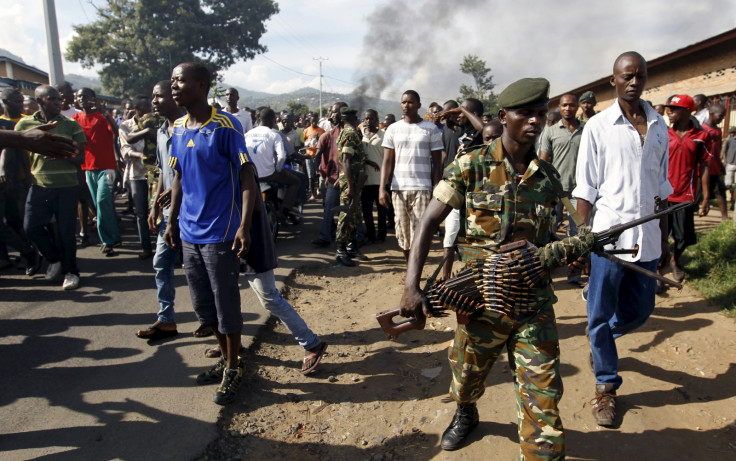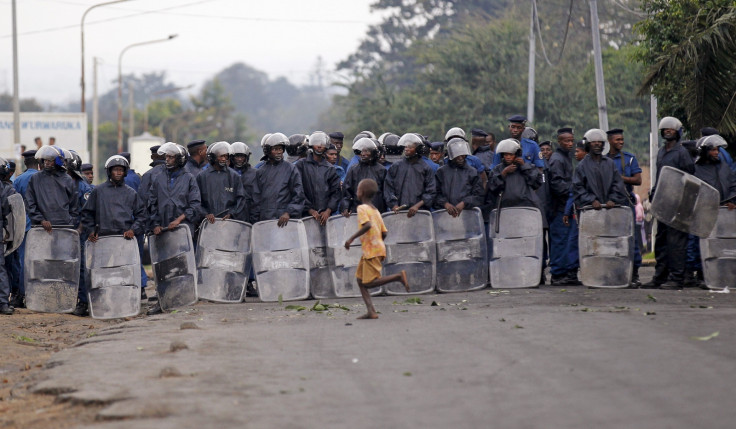Burundi's president should prepare for a military overthrow, claims opposition figure

Burundi's military may be planning to overthrow the country's president Pierre Nkurunziza, whose controversial third-term bid was approved on Tuesday 5 May by the constitutional court, IBTimes UK can reveal.
Hundreds of protesters have taken to the streets of the capital, Bujumbura since 26 April in opposition to Nkurunziza's decision to seek a third term.
A third term, they say, is prohibited by the country's constitution and Arusha Accords, agreed to at the end of a 13-year deadly civil war between Hutus and Tutsis that killed an estimated 300,000.
"I know the army will revolt. The army can rise any time now, and it will only take them to see that there is a huge part of the population who wants to see the president overthrown (to do it)."
- Pierre-Claver Mbonimpa
"[The] Military support the demonstrators because they believe the president should respect the Arusha Accords and the Constitution," Pierre-Claver Mbonimpa, the leader of Burundi's civil society and opposition figure, told IBTimes UK in a phone interview from Bujumbura.
"I know the army will revolt. The army can rise any time now, and it will only take them to see that there is a huge part of the population who wants to see the president overthrown (to do it)."
Deep divisions within security forces
The civil war that ended in 2006 scarred the army, then dominated by the ethnic Tutsi minority, against rebel groups mostly made up of majority Hutus, one of them led by Nkurunziza.
"For a long time I know that there has been a disagreement between the police and the military, who do not view the world from the same perspective. It is not a community division, but rather a political one," the leader of Burundi's human rights association, Aprodh, explained.
The divisions were confirmed by a diplomat, who told news agency AFP on 5 May "there are some pretty serious differences within the security forces".
The army now includes both ethnic groups, but the police is still made up at 80% by Hutus, explained Mbonimpa. Education levels, he added, are also playing a part in creating divisions between the two forces.
"20% of the police force is Tutsi, which is why I believe there is a lot of violence committed by police officers. They do not all have sufficient academic level, many who can not read or write follow violent orders to the letter -- without analysis.This is different from the military, who are selected in the army on the basis of a more or less higher education level."
Police loyal to president
On Saturday 3 May, defence minister General Pontien Gaciyubwenge's statement declaring the army's neutrality and calling for an end to attacks on citizens' rights appeared to flag up possible divisions in the army, which has regularly come between the police and demonstrators to avoid further clashes.

Following his declaration, human rights activist Mbonimpa told IBTimes UK that General Gaciyubwenge had been summoned by the president.
The next day, the chief of staff of Burundi's army, General Prime Niyongabo, pledged the military's loyalty to the country's authorities. Despite this pledge, however, Niyongabo warned against trying to use the army for political ends.
General Niyongabo called on soldiers "to stay calm, united and not to give in to any political approaches".
"Fortunately we have the support of the military, otherwise we would have had a lot of damage, because frankly, the police has committed a lot of violence. I understand them, however, because many policemen came from the rebellion, that is to say they are loyal supporters of the ruling party," Mbonimpa explained.
At least 12 have been killed and scores have been injured since the protests began the weekend before last.
Some 600 have been arrested since a crackdown on protesters began, something the president of the United Kingdom Burundian Diaspora, Fred Ngamiye, believes is paving the way for Burundi to "fall into civil war".
"We are heading towards hell because of unwise political decisions from [the ruling party] CNDD-FDD. I'm very scared about it and the majority of Burundians are scared too," he told IBTimes UK.
© Copyright IBTimes 2025. All rights reserved.






















